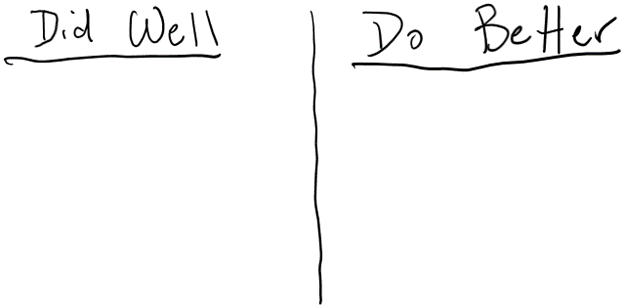Did Well, Do Better | Zach Miller
See the full episode notes HERE
Do you spend more time in reflection or strategy?
You’re never too busy to make time for the things that matter. In our digitally connected world, you are under tremendous pressure to always be “on” or thinking about the next thing. Reflecting is necessary if you want to improve as Josiah explains:
“I think it's a lost skill. It's a lost art. Reflection is this mental review. There is so much connective tissue that is happening from a cerebral perspective when we stop and we actually reflect on what has been done, right. I think we lose so much learning, right? Think about this. With the volume of water that we're drinking from this proverbial fire hose of information, right? How in the world can we perform at high levels when we are not even taking the time to reflect? How can we do it? It's impossible”.
Dedicating time to reflecting may seem like wasted time until you can get good at using it to find concrete areas of improvement. Strategy and planning are useless if you do not understand what worked or didn’t work and the why. The best pros understand this, and it transcends sports and can be found in any elite discipline.
This subject reminds me of what Dana Cavalea said here. A championship mindset does not have to apply only to sports. Championship athletes that own their careers while playing understand the balance between reflection and strategy. They do this efficiently and are not time-wasters.
Did well, do better?
One of the things I miss about football that I never thought I would is the film review. Every practice and every game is taped and reviewed for improvement. The saying “the tape never lies” is the most accurate quote in sports. One of the strongest lessons I learned was to not take criticism personally. No doubt, my pride motivated me to never want to put poor play on film but you soon realize at the professional level failure is common against elite talent. The athletes that take ownership over their performance and implement the coaching they receive, constantly improve. It doesn’t matter if that’s sports, family, or business.
“So when you reflect, I give a formula, if you will. And I can't take credit for it because it's been around longer than me, did well, do better. Four words, did well do better. What did I do well today? Boom, boom, boom, boom, boom. List them out. What could I do better? I could've done this. I could've done that. I could have done those. I can do. That's a formula that I've used for years. I used to use it with my team of guys that we used to work with on the performance team, mental skills. And we would break down every classroom that we had in front of our athletes. What do we do well today, guys? We did this. Bam, bam, bam, bam. Okay. What could we have done better? Notice I said, did do better. I didn't say, what did we suck at? What was terrible? Where did we fail? No. Lexicon, baby. Vocabulary. What can we do better? And what happens is you are in essence, taking inventory of what has happened, and you're affirming what you did well. And you are in essence, preparing and making a plan for what you're going to do next time. And what happens is, if you continually do this, you'll start to see that there's a shift in your list” – Josiah
The key with this saying is to recognize what you do well and what can be improved. Just focusing on what you didn’t do well can lead you down a negative spiral. Language matters and your self-talk matters as Josiah has elaborated on his previous ACEO that I wrote about.
The time to evaluate and reflect is not in the moment of performance. One play at a time and neutral thinking as Trevor Moawad writes about in It Takes What it Takes is key during a game to keep focused. Becoming distracted or dwelling on a recent mistake during a game leads to more mistakes and unforced errors. Sharpening your mind to forget what just happened both good and bad allowed me to play at a high level in the NFL. The reflection comes when you can identify what happened, why, and only then can you change strategy to improve. Sometimes there is nothing to change and staying the current course is the best alternative.
How do you start?
Creating a new habit is difficult. You will not be good when you first start. You must work and put the required effort to create the habit. Do not let perfect be the enemy of good here. You will get better and you will improve the longer you do it.
“After every performance, after every practice, after every session, write down, take a notebook, split it in half. Did well, do better. What did I do well today in today's competition? In today's practice, in today's demonstration, what did I do well? Write them all out. What could I do better? Be honest. What could I do better? Write it out. And then you reflect. You spend time and you just study that list. And then what happens is your did well, or your do better side becomes your plan. It becomes your action item for the next day”.
Your 1st step is get a notebook and draw a line down the middle and write what you did well and what you can do better (The act of writing has proven to be better than typing). Do this every practice:


